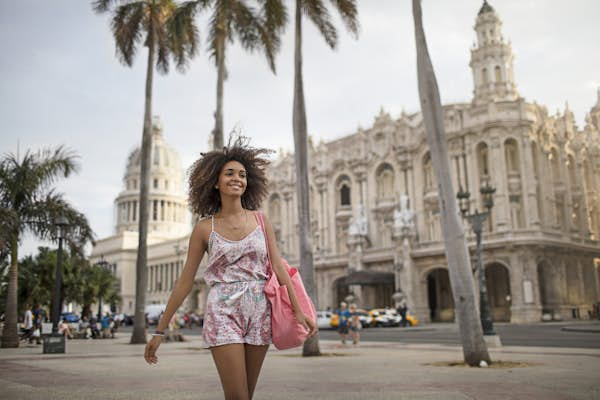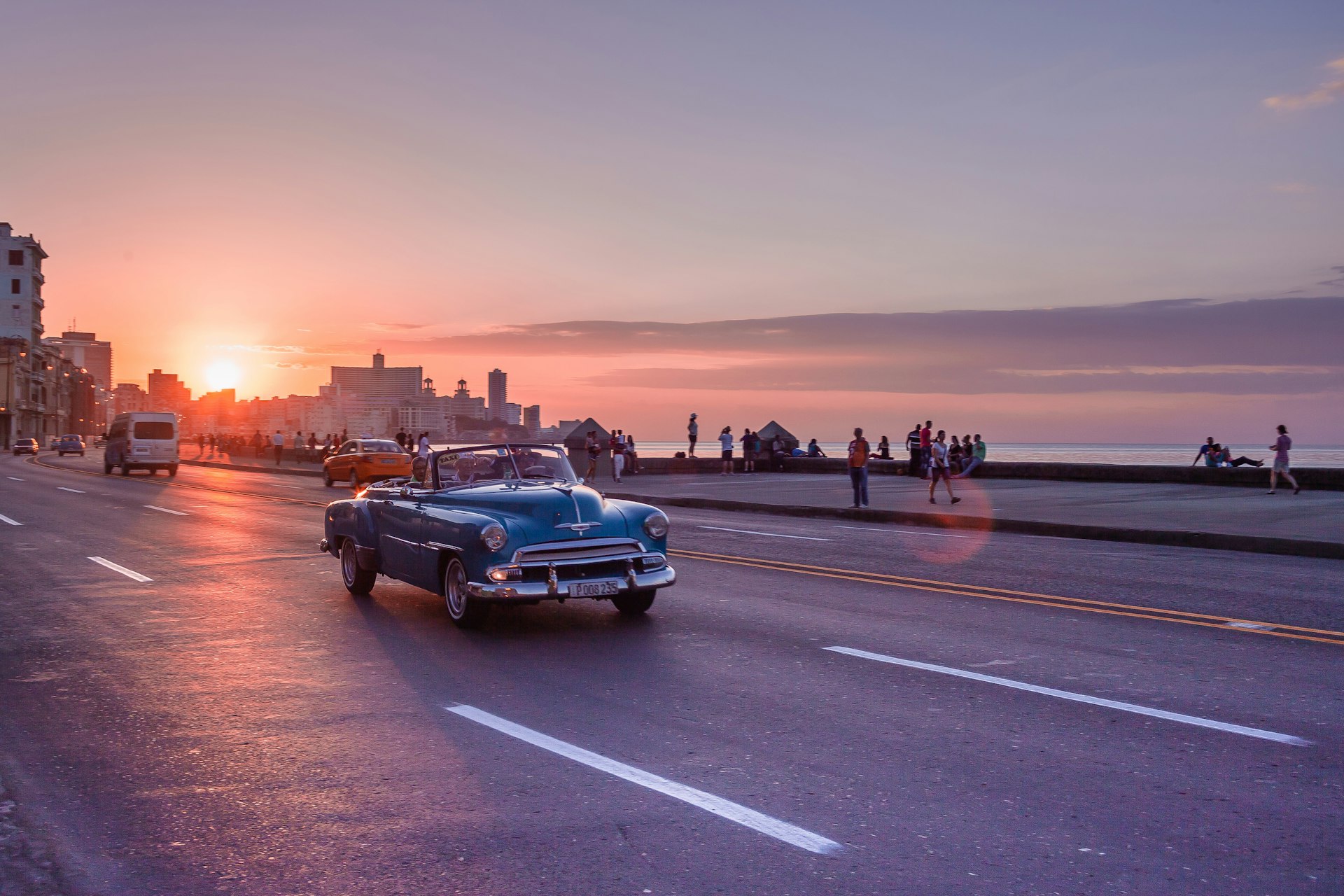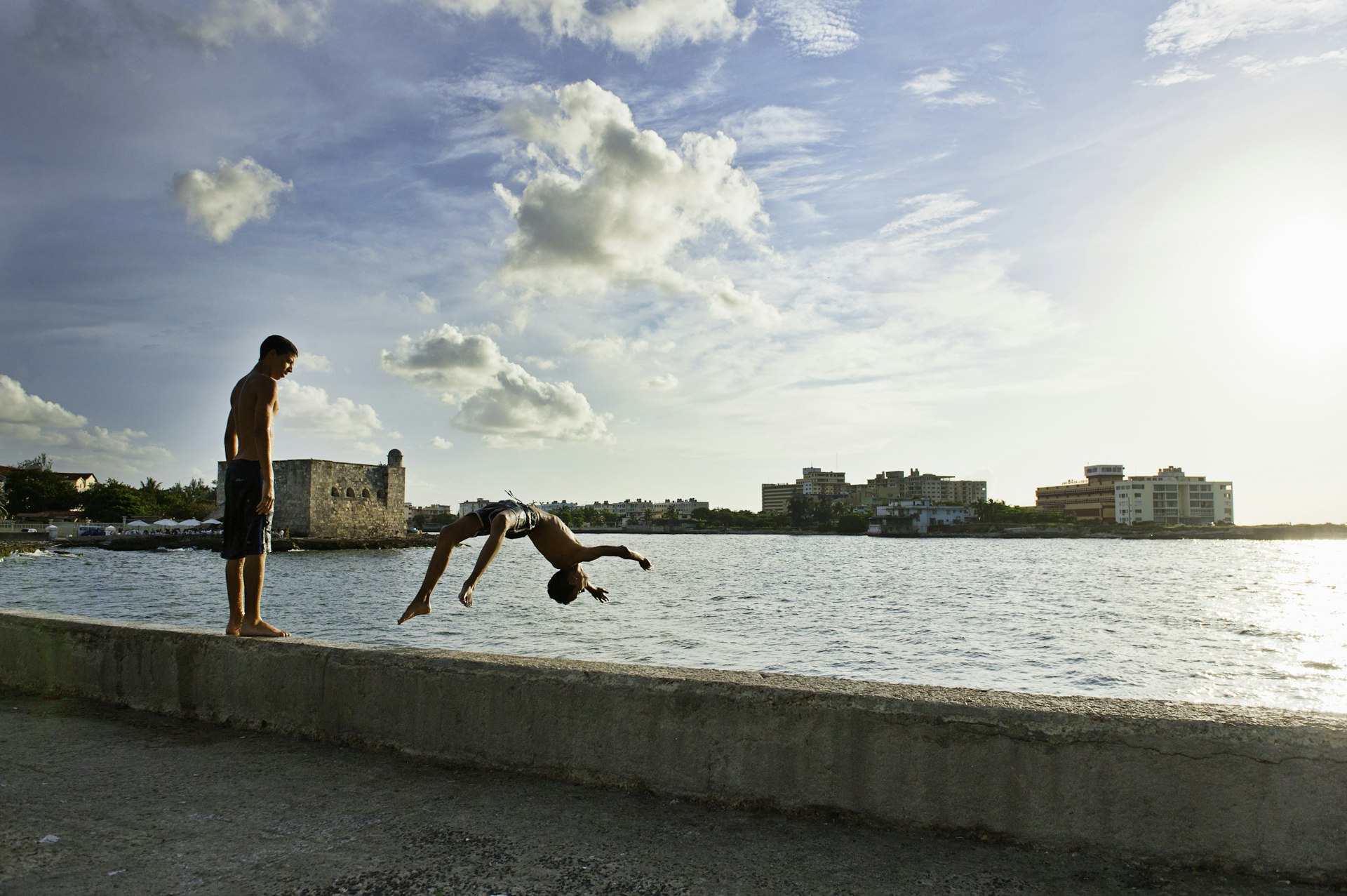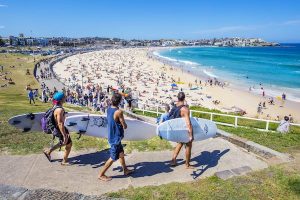
Havana’s cultural calendar is full of visit-worthy events every month, with the more prestigious festivals taking place between October and April.
Jazz or ballet? Religious processions or fiery festivals? Cheap hotel deals or cool temperatures? You’ll be able to find something to fit your taste and budget throughout the year.
Lapped by the choppy waters of the Straits of Florida, Havana is always warm, but it hits a climatic peak during the northern hemisphere winter when the weather is dry and not too humid. This seasonal guide with month-by-month events can help you plan the best time for your visit to Havana.
Make the most out of every adventure with help from our weekly newsletter delivered to your inbox.  Every month in Havana sees a colorful celebration or event © Kamira / Shutterstock
Every month in Havana sees a colorful celebration or event © Kamira / Shutterstock
November to March, July and August are the best times for beaches
Havana’s high season stretches from November to March when hordes of tourists from Europe and Canada flee the snow and freezing temperatures and decamp to Cuba. While many head to the all-inclusive resorts that line the north coast, a good proportion spend at least part of their time in Havana.
Prices for flights, hotels and packages start going up from early to mid-November and nudge even higher (as much as 25%) over Christmas and New Year’s. The busiest month in terms of tourist numbers is January, closely followed by February and March, when the weather is dry but not too hot and tempered by the occasional frente frio (cold front). Crowds aside, this is the perfect time to visit the beaches of Playas del Este and partake in a range of water activities. It’s also the conclusion of Cuban baseball’s National Series and a potentially exciting time for fans of Havana’s Industriales team.
The mini-high season of July and August is when Cubans go on vacation. This two-month-long summer spike affects the country’s cheaper hotels and rural campismos (affordable rustic accommodations) but has less of an impact in Havana, except during the city’s annual carnival in August.
The shoulder season months of April and October have fewer visitors
Foreign visitors begin tailing off in April, and prices start to fall after Easter. Despite waning tourist numbers, the weather remains good; April is the second driest month and the least humid.
Conversely, October can be wet and stormy, although early fall delivers some excellent annual events. Havana’s internationally acclaimed theater and ballet festivals are both worth planning a trip around.
 There are fewer visitors to Havana in May, June and September © Agota Kadar / Shutterstock
There are fewer visitors to Havana in May, June and September © Agota Kadar / Shutterstock
May, June and September are the best months for budget travelers
Low season is prime time for budget travelers, crowd-avoiders and those not averse to getting a little wet. Bear in mind that Havana’s showers – even in the June to November rainy season – are usually short and heavy, with the rain rarely lasting all day.
While there are not a ton of quirky festivals to savor during the off-season, Havana never lacks life, and all the best museums and sights remain open year-round. Accommodations-wise, you’ll pay cheaper rates and find better availability in the low season. Similarly, travelers will enjoy shorter lines, less crowded beaches and a quieter, slicker airport experience.
Havana is busy with visitors in January
The tourist season hits its apex as the new year dawns. January is Havana’s busiest month, lending the city a palpable buzz starting with New Year celebrations, which in Cuba are far feistier than Christmas. Sporadic cold fronts keep the weather fresh: January is Havana’s coolest month, with average daily temperatures of around 22ºC (72ºF).
Key event: Festival Internacional de Jazz
February is an expensive time to visit
The peak tourist season continues in February, and high demand pushes up hotel prices and can lead to occasional shortages, particularly for rental cars. Calm seas and less fickle weather make this an ideal time for water sports, especially diving from one of the city’s two marinas, Tarará and Hemingway.
Key events: Feria Internacional del Libro, Festival del Habano
March is the end of the high season
In March, the high season draws to a close with dry, coolish weather and relatively low humidity. Sharp-eyed travelers should look out for migratory birds that congregate in some of the city’s large green spaces, including Parque Lenin and the Jardín Botánico Nacional.
Key event: Havana Rhythm and Dance Festival
 Havana is sunny and less crowded in April © Image Source / Getty Images
Havana is sunny and less crowded in April © Image Source / Getty Images
It’s sunny in April
The high season often extends into April, especially in years when Easter is late. Wait until it’s over, and then hunt around for bargains. With good weather (it’s the sunniest month) and less crowded beaches, April is a good time for fishing in the Gulf Stream and kitesurfing at Tarará.
Key event: Bienal de la Habana
May is a good time for budget visitors
Ranking as one of the cheapest months, May marks a sweet spot between the crowded winter season and the domestic barrage of summer. It also offers a potential weather window. While black rain clouds amass in the east, the rain hasn’t yet reached the high deluge levels of June. Look out for special deals at resort hotels and slightly cheaper prices all around.
Key events: Cubadisco, Día Internacional Contra Homofobia, Transfobia y Bifobia
June marks the start of hurricane season
The Caribbean hurricane season usually starts with a whimper as opposed to a bang. Big storms are an exception rather than a rule in June, although it’s the wettest month for all-around rainfall. Prices are still low, and with heat and humidity rising, travelers from Europe and Canada tend to stay away. June is the height of mango season – reason enough to visit!
Key event: Torneo Internacional de la Pesca de la Aguja
 Cool off in the hot high season months with a fresh mojito at the famous Havana bar La Bodeguita del Medio © Kamira / Shutterstock
Cool off in the hot high season months with a fresh mojito at the famous Havana bar La Bodeguita del Medio © Kamira / Shutterstock
July is Cuban vacation time
July kick-starts the Cuban domestic vacation season with families heading to the coast and countryside. Expect the beaches of Playas del Este and its cheap hotels to be mobbed. The month is invariably hot, sunny and humid, leading up to the political polemics of the July 26 public holiday.
Key events: Día de la Rebeldía Nacional (July 26)
August is Havana’s hottest month
Scorching temperatures are guaranteed – August is the city’s hottest month – and Havana turns the heat up further as it prepares for its caliente (hot) carnival. Playas del Este still heave with holidaying Cubans, and the city sees a small influx of visitors from Mediterranean Europe enjoying their annual summer vacation.
Key events: Carnaval, Festival Internacional de Rap
September is peak hurricane season
September is the quietest month in Havana unless you’re talking wind noise. It’s peak hurricane season when the outside chance of a “big one” (usually every four to five years) keeps many Cuba-philes at bay. The advantages? Lower hotel prices, near-empty beaches and plenty of elbow room in the city’s forts and museums.
Key event: Procesión de la Virgen de Regla
There are major cultural events in October
Continuing storm threats, oppressive humidity and persistent rain dampen tourist numbers, and Playas del Este’s resorts remain in a post-summer lull. Meanwhile, Havana’s cultural life begins an end-of-year surge, hosting ballet and theater festivals of international caliber.
Key events: Festival Internacional de Ballet de la Habana, Festival de Teatro de la Habana
November means increased hotel rates
When snow starts falling in Canada, and Europe’s temperatures get too cold for T-shirts, Cuba’s big tourist invasion moves into high gear with an accompanying hike in hotel rates. More than a quarter of Havana’s winter tourists come from Canada, and they start arriving in early to mid-November. As the rainy season draws to a close, temperatures become more bearable, and acclimatized runners line up for Havana’s annual marathon.
Key event: Marabana
December is an expensive time to visit
December brings one of Havana’s biggest international festivals (dedicated to film) and its most devotional religious procession (dedicated to San Lázaro). Christmas celebrations have been reignited in the last two decades after practically dying out during the early years of the Revolution. Price-wise, the Christmas-New Year period is the most expensive time to visit.
Key events: Festival Internacional del Nuevo Cine Latinamericano, Procesión de San Lázaro



